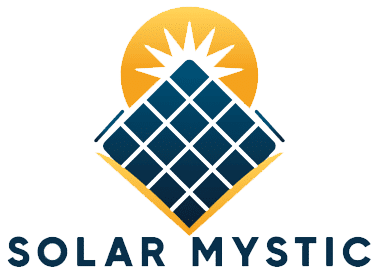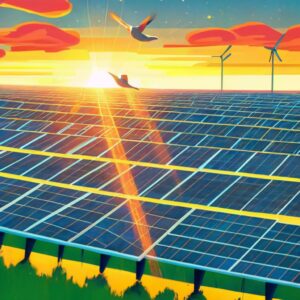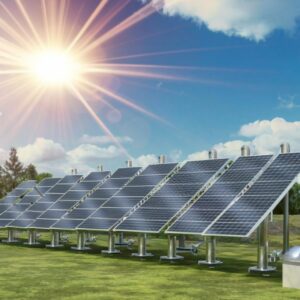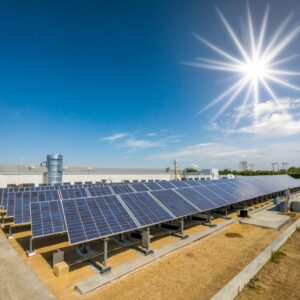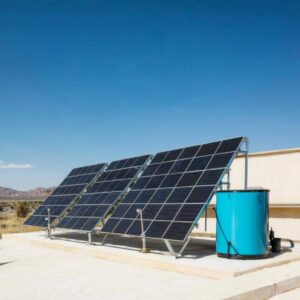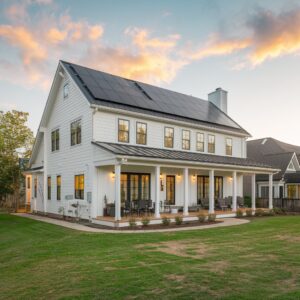
Thinking about installing home solar panels? You’re making a smart choice! Solar energy systems offer numerous benefits, from cost savings on electricity bills to reducing your carbon footprint. In this comprehensive guide, I’ll walk you through everything you need to know about solar panel installation.
Solar panels work by capturing sunlight and turning it into energy. They use the photovoltaic effect. It’s when sunlight hits the cells of the panels and creates electricity. There are different types of solar panels, each best for different uses.
Key Takeaways:
- Solar panels use the photovoltaic effect to generate electricity.
- There are different types of home solar systems, including grid-tied, hybrid, and off-grid.
- Factors to think about before getting solar panels include upfront costs, roof suitability, energy usage, and net metering options.
- Installing solar panels offers benefits such as cost savings and reduced carbon footprint.
- The average cost of a home solar energy system is about $18,000 after tax credits.
How Solar Panels Work
Solar panels are key to solar energy systems. They are made of photovoltaic cells crafted from silicon, a special material. This material changes sunlight into electricity directly. The way they create electricity is interesting and requires a few important steps.
- Photovoltaic Cells: PV cells are the core of a solar panel. They’re built to catch sunlight and change it into electric power. When sunlight hits the silicon, it makes the electrons really energetic. This causes them to leave their atoms and create an electric flow.
- Electric Current: Once free, the electrons form an electric flow within the PV cells. This flow is what we call direct current (DC), the kind of power solar panels make.
- Solar Inverter: But, most home appliances run on a different type of power, alternating current (AC). So, the DC power from solar panels has to change to AC. A solar inverter does this job. It makes the solar electricity usable by your home or building.
- Grid-Tied, Hybrid, or Off-Grid System: How a solar system connects to the power grid varies based on its design. A system tied to the grid connects to it. It lets you share extra power with the grid for credits. A hybrid adds a way to save power in batteries for emergencies. An off-grid system doesn’t use the grid at all. It relies on its own stored power.
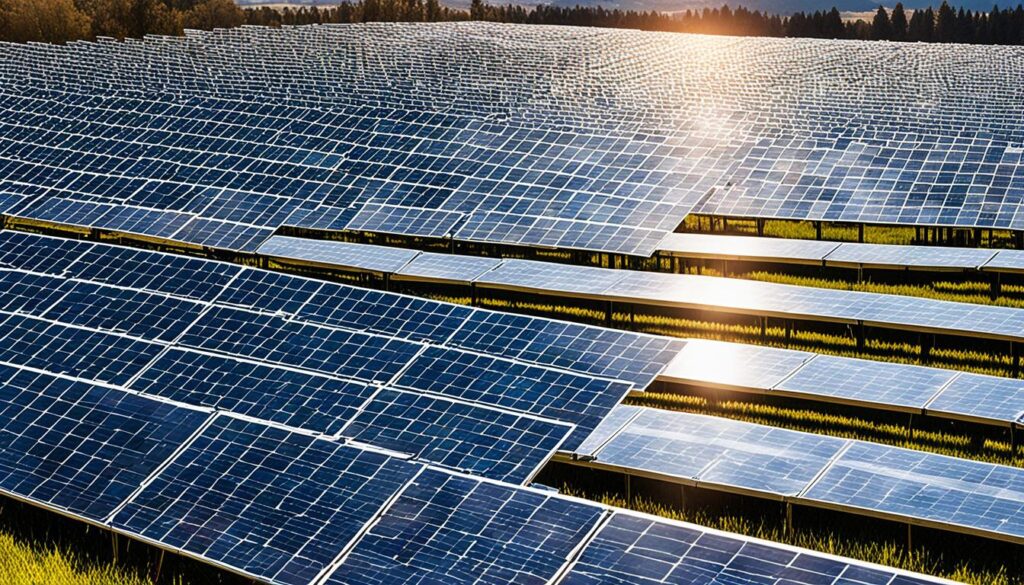
Solar panels are environmentally friendly. Their power lessens the need for traditional fuels and cuts down on harm to our planet. They are used to power homes, businesses, and electric cars. Solar panels are an eco-conscious way to fulfill our energy demands.
Things to Consider Before Getting Home Solar Panels
Think hard before you install solar panels on your roof. You should weigh the good and bad points. This decision affects both your energy use and your wallet.
The Pros of Solar Panels
Choosing solar panels has its upsides for those who own homes:
- Reduced Electric Bills: These panels can cut your electricity costs, saving money in the long term.
- Insurance Against Rising Power Costs: They keep your energy costs stable, protecting you from future price jumps.
- Utilizing a Renewable Energy Source: Solar energy is eco-friendly and never runs out. Using it helps the planet.
- Low Maintenance Costs: Once up, solar panels need little upkeep. They offer steady power without high running costs.
This list shows why many choose solar panels for their homes.
The Cons of Solar Panels
However, solar panels have some downsides too:
- High Upfront Costs: Buying and setting up solar panels is expensive at first. But, it’s a smart long-term investment.
- Intermittent Energy Source: Their energy comes from the sun, so it varies with the weather. But, new battery tech helps store extra power.
- Environmental Impacts of Panel Manufacturing: Making solar panels does have some cost to the planet. Yet, it’s less than traditional energy production.
- Potential Difficulty Selling a Home: Not all homebuyers may want a house with solar panels. But, they can increase your home’s value for the right buyer.
Knowing these facts will help you decide if solar panels are right for you.
Cost Considerations
The price of solar panels includes setting them up and the savings they bring over time. Despite the starting cost, they can save you a lot of money in the long run.
Your home’s energy use affects the system size you need. It’s wise to get a slightly bigger system for future needs.
See if you can get financing for your solar project. Many firms have plans to help with the initial cost.
Net Metering and Incentives
Understanding your area’s net metering rules and incentives is key. Net metering lets you sell your extra power, cutting your costs further.
Plus, there are many rebates and incentives offered by different levels of government. Look into these to see what’s available to you.
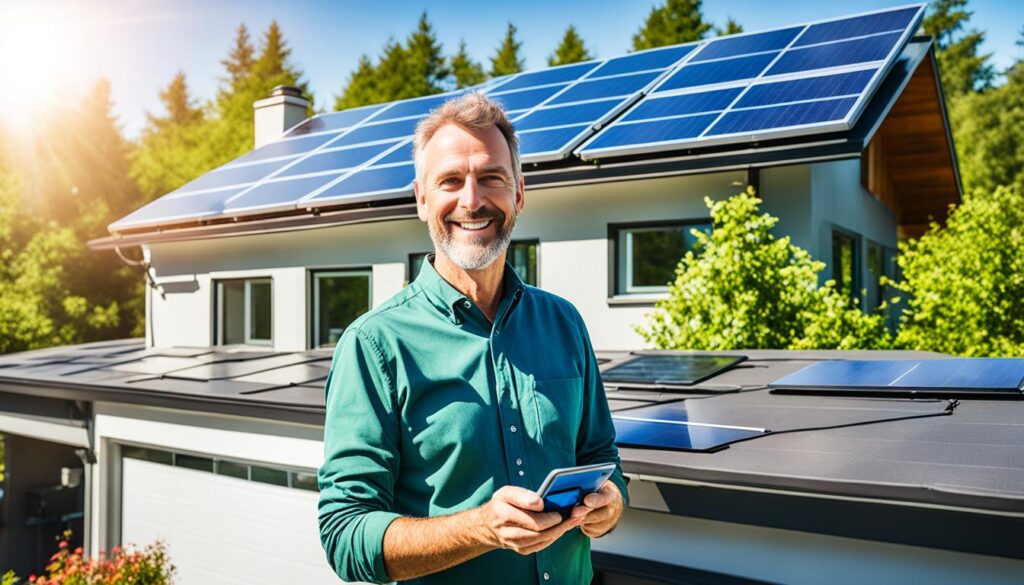
Taking the time to think about the benefits, costs, and available incentives can help you choose wisely. Going solar not only saves you money but helps the environment too.
Conclusion
Solar panels offer big savings on electricity and boost energy security. They lower our impact on the environment too. Plus, they might raise your home’s value.
It’s key to pick experienced installers who meet high industry standards. Look at what other customers say. Make sure they offer good service and maintenance.
Think about your energy use and roof space when deciding on a solar system size. The proposal you get should detail what you’ll need and the benefits you can expect.
First, work on making your home more energy efficient. Get quotes from a few installers to find the best fit for you. This way, you’ll get the most out of your solar investment.
FAQ
What are the benefits of installing home solar panels?
FAQ
What are the benefits of installing home solar panels?
Home solar panels save money on electricity bills and cut back on carbon footprints. They cost around ,000 with tax credits. They save about
FAQ
What are the benefits of installing home solar panels?
Home solar panels save money on electricity bills and cut back on carbon footprints. They cost around $18,000 with tax credits. They save about $1,500 a year for homeowners.
How do solar panels work?
Solar panels change sunlight into electricity through silicon cells. These cells get excited by sunlight, creating an electric current. A solar inverter then changes this current into alternating current for daily use.
What types of home solar systems are there?
There are grid-tied, hybrid, and off-grid solar systems for homes. Each type interacts differently with both the home and the electric grid.
What factors should I consider before getting home solar panels?
Think about upfront costs, energy source reliability, and resale value when considering solar panels. Roof suitability, energy use, and net metering are important as well.
What are the pros and cons of installing home solar panels?
Pros of home solar panels are lower electric bills and protection against power price increases. They also use renewable energy and have low upkeep costs. But, they also have high upfront costs and may make selling a home harder.
How can I choose the right installer for solar panel installation?
When picking an installer, look at their industry credentials and what customers say. Also, check their service and maintenance options.
How do I determine the size of the solar PV system I need?
Calculate your solar PV system size based on energy use and roof space. Oversizing can prepare you for future energy needs.
What should be included in a solar panel proposal?
A good proposal lists the number and type of panels, the needed inverter, and the expected payback.
What are the benefits of solar panel installation?
Solar panel installation can save you money, make your home’s energy supply more secure, and lower your environmental impact. It might also increase your home’s value.
How do I compare quotes from different solar panel installers?
Before you install, boost your home’s energy efficiency. Then, compare multiple quotes. This will help you find the best deal.
,500 a year for homeowners.
How do solar panels work?
Solar panels change sunlight into electricity through silicon cells. These cells get excited by sunlight, creating an electric current. A solar inverter then changes this current into alternating current for daily use.
What types of home solar systems are there?
There are grid-tied, hybrid, and off-grid solar systems for homes. Each type interacts differently with both the home and the electric grid.
What factors should I consider before getting home solar panels?
Think about upfront costs, energy source reliability, and resale value when considering solar panels. Roof suitability, energy use, and net metering are important as well.
What are the pros and cons of installing home solar panels?
Pros of home solar panels are lower electric bills and protection against power price increases. They also use renewable energy and have low upkeep costs. But, they also have high upfront costs and may make selling a home harder.
How can I choose the right installer for solar panel installation?
When picking an installer, look at their industry credentials and what customers say. Also, check their service and maintenance options.
How do I determine the size of the solar PV system I need?
Calculate your solar PV system size based on energy use and roof space. Oversizing can prepare you for future energy needs.
What should be included in a solar panel proposal?
A good proposal lists the number and type of panels, the needed inverter, and the expected payback.
What are the benefits of solar panel installation?
Solar panel installation can save you money, make your home’s energy supply more secure, and lower your environmental impact. It might also increase your home’s value.
How do I compare quotes from different solar panel installers?
Before you install, boost your home’s energy efficiency. Then, compare multiple quotes. This will help you find the best deal.
